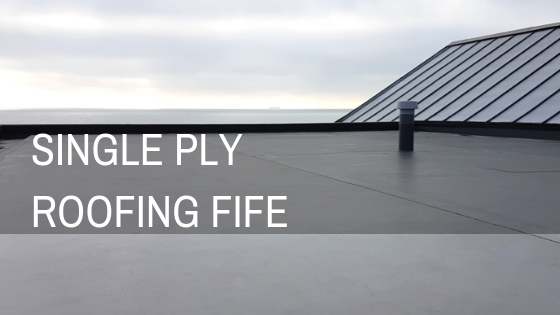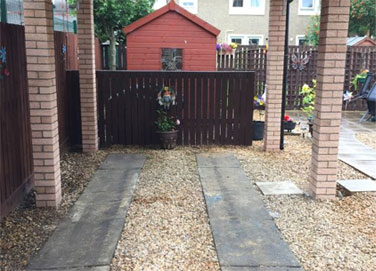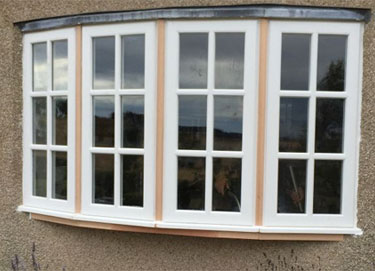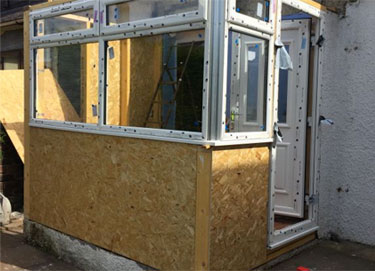Single ply roofing has become an increasingly popular flat roof covering over the last few years in Fife.
Related content:
Flat Roof Systems: Advantages & Disadvantages
What Is Single Ply?
Single ply membrane is a complete roofing system.
It is created from strong and flexible membranes composed predominantly of synthetic polymer.
The thickness of single ply membrane is in the range 1.1mm to +2mm.
Some products are homogenous, others are reinforced with glass fibre or polyester, depending on the application.
Membranes are sealed at joints to form continuous waterproofing. When combined with insulation and continuous support, they form complete, durable roof systems.
Single Ply Roofing Types Fife
- CPE – Chlorinated Polyethylene – Polyethylene is made flexible by chlorination and can be heat or solvent welded. Generally, CPE is compatible with bitumen.
- EPDM – Ethylene Propylene Diene Terpolymer – EPDM is a naturally flexible material to which carbon black is added for stability. Jointing is normally carried out with tape bonding using a special primer, but adhesives can also be used. EPDM is compatible with bitumen.
- FPO – Flexible Polyolefin – FPO is a large family of heat-weldable polyolefin based upon polyethylene or polypropylene. Preparation of the lap prior to welding may be required. FPO-based membranes are generally suitable for direct contact with aged bitumen. Generally FPO based membranes can be recycled back into themselves or into another product.
- PVC – Polyvinyl chlorid – A flexible form of PVC due to the addition of high molecular weight plasticizers, which can be heat or solvent welded (depending upon the product). PVC-p-based membranes are generally not suitable for direct contact with bitumen unless a suitable weight of fleece backing is incorporated to separate the two
- TPE – Thermoplastic Polyolefin Elastome – A particular group of polyolefins with the basic properties of elastomers but which can be processed as thermoplasts. They exhibit a high resistance to UV /Ozone exposure and do not absorb moisture. Laps are heat welded without production of fumes or smoke. The wide temperature range for welding enables secure welding of seams in differing climatic conditions.
- PIB – Polyisobutylene – PIB incorporates carbon black to provide good physical properties. PIB products available on the UK market are generally solvent welded using tape systems. and are compatible with bitumen.
- VET – Vinyl ethylene terpolymer – VET consists of PVC made flexible by blending with Ethylene Vinyl Acetate (EVA). VET can be heat or solvent welded and is compatible with bitumen.
Benefits of Single Ply Roofing
Regardless of the type of roofing material that you’re considering to use, there are many universal benefits in choosing a single ply membrane roof. These include:
- Resistant to UV & Natural Elements
A fundamental requirement for any roofing material is the assurance that it’s resistant to damaging ultraviolet light. Not only are most single ply membrane materials 100% UV resistant, but they’re also not affected by the build up of potentially harmful micro-organisms.
- Durable
When applied with a hot air weld, the single ply roof membrane also provides your building with some much needed protection against changing weather conditions and even the most extreme temperatures.
- Fire Retardant
Due to their composition, single ply membrane roofs are also fire resistant and even self-extinguishing. For any business, organisation or workplace that is concerned about the fire safety of their employees, visitors or customers then single ply roofing is certain to provide you with both confidence and security.
- Resistant to Chemicals
For areas that are likely to be exposed to potential harmful chemicals, it’s certainly reassuring to know your roofing material is protecting yourself and your building against acid rain and other forms of acidic outflow.
- Eco-Friendly
In comparison to the more traditional industrial roofing materials, single ply membranes are considerably more environmentally friendly in their production, longevity and ability to be recycled. Thermoplastic Polyethylene (TPE) is claimed to be the most eco-friendly variation that’s currently available
Why Single Ply?
Single Ply is quick to install and cost effective.
It’s durable and flexible and Bauder is committed to reducing the impact our single ply options have on both society and the environment.
Single Ply Installation Fife
The systems are installed using hot air welding techniques with mechanical fastenings or adhesive bonding to provide solutions that are durable, resilient to the natural elements and give excellent fire resistance.
The quality and experience of the installing operative is paramount to ensuring a successful project.
If you are looking for a roofing contractor to carry out your single ply installation in Fife, then get in touch with us today.






